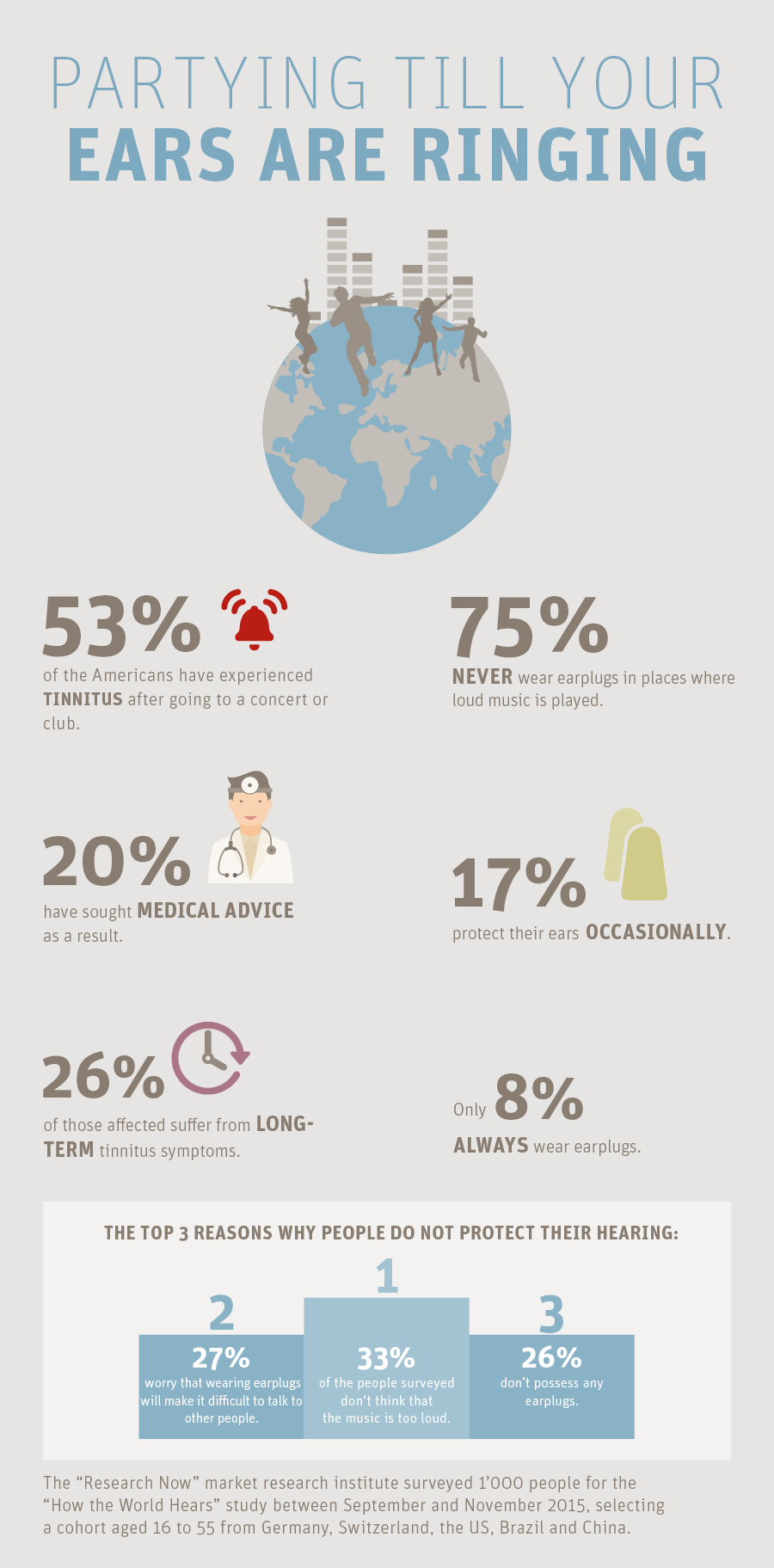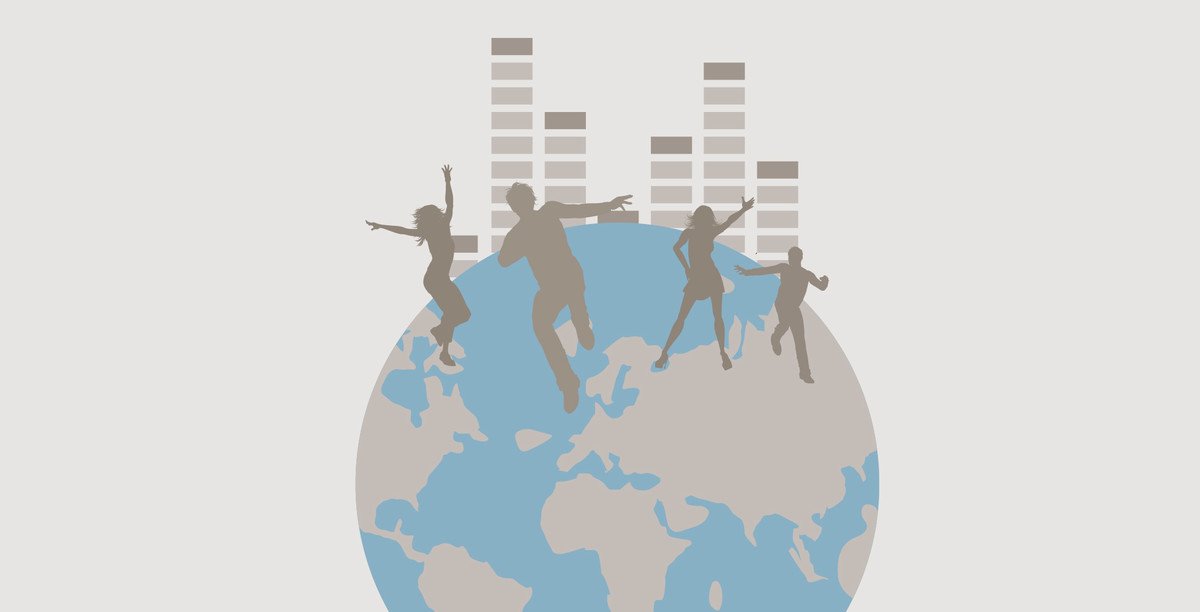Staefa, Switzerland, June 8, 2016
The latest study by the Hear the World foundation reveals that 53% of american music fans surveyed have already experienced tinnitus. Whether it is a popular concert, a trip to a festival, or partying at a club, more than half of US music listeners surveyed regularly go out and enjoy music to the fullest. What many of them forget, however, is that while listening to great sounds is a lot of fun, it can have serious implications for our hearing. Right on time for the summer concert season, in its “How the World Hears” study, the Hear the World Foundation took a close look at the listening behavior and its potential consequences – with alarming results: for example, 53% of people surveyed in the US had previously experienced tinnitus after going to a concert or a club. A total of 75% of those questioned admitted to never wearing hearing protection in places where loud music is playing. And 30% of them underestimated the actual sound volume – a misconception that can have a disastrous impact on their hearing.
No doubt about it, going out, partying and enjoying music is great fun. However, when you consider that noise volumes at concerts and clubs can reach 100 decibels or more (comparable to the volume of a chainsaw), it is essential for every one of us to protect and preserve our sense of hearing. After all, once it has been damaged, there may be no going back – temporary hearing loss caused by excessive volume can lead to permanent hearing loss. In its “How the World Hears” study, 1 the Hear the World Foundation examines the question of how we handle our hearing and sheds light on what we know about hearing and hearing loss.
Key US facts at a glance:
- Over half (51%) of US participants surveyed go to locations where loud music is played, such as concerts or clubs, with 34% doing so several times a year (but less than one a month), 11% at least once a month, and 6% at least once a week.
- 53% of them say that they have experienced tinnitus after going to a concert or a club; 20% of those surveyed have sought medical advice on account of this and in 26% of cases the tinnitus developed into a long-term problem.
- Only 8% surveyed always wear hearing protection in places where loud music is playing, while 17% protect their ears occasionally.
- The main reasons why only 8% protect their ears are as follows: 33% of them underestimated the actual sound volume, 27% worry that wearing hearing protection would make it difficult to talk to other people and 26% fear it would restrict their enjoyment of the music.
- 38% surveyed say that they would always wear earplugs if they were handed out free of charge, while 24% would do so occasionally.
- In an international comparison, Brazilians top the list at 64% of those surveyed are regular visitors to events where loud music is played. They are also the front-runners in terms of cases of tinnitus, with 67% of those surveyed indicating that they had been affected by this before. The Swiss boast the lowest tinnitus rate (48%) despite being the second most frequent visitors to places with loud music (57%). One possible reason for this is that event organizers in Switzerland are obliged to hand out free hearing protection.
“Music is one of the most wonderful gifts our hearing can give us,” says Soriya Estes,AuD, owner of Estes Audiology Hearing Centers in central Texas. “For me, the study shows how difficult we find it to strike a balance between enjoying music and protecting our hearing. It is certainly alarming that well over half of the American people questioned have experienced tinnitus after going to a concert or a club. Excessive exposure to loud music has been found to cause a temporary loss in hearing which may lead to permanent hearing loss. It’s most likely that 75% of Americans never wear hearing protection and underestimate the actual sound volume simply due to lack of knowledge. Generating awareness about the threat to one’s hearing health and educating people about available hearing protection is key and a topic everyone in hearing health care can and should promote.”
For more information on the effects of noise on hearing, go to http://www.hear-the-world.com/en/knowledge/how-loud-is-too-loud
How to protect your hearing at concerts and clubs:
- Always wear earplugs.
- Do not stand too close to the stage or loudspeakers.
- Use smartphone apps that measure ambient noise levels.
- Avoid continuous exposure to loud noise at festivals and make a conscious effort to build in rest breaks for your ears between concerts.
- Make sure you always drink plenty of water. This improves the flow of blood to the hair cells in the cochlea, thus helping our sense of hearing to function.
- After leaving a noisy environment, give your ears sufficient time to rest – at least 10 hours.
- If you experience tinnitus anyway, go and see a physician immediately if the problem persists.
1 The “How the World Hears” study was conducted by the market research institute “Research Now,” which surveyed groups of 1,000 people between the ages of 16 and 55 in Germany, Switzerland, the USA, Brazil, and China.



